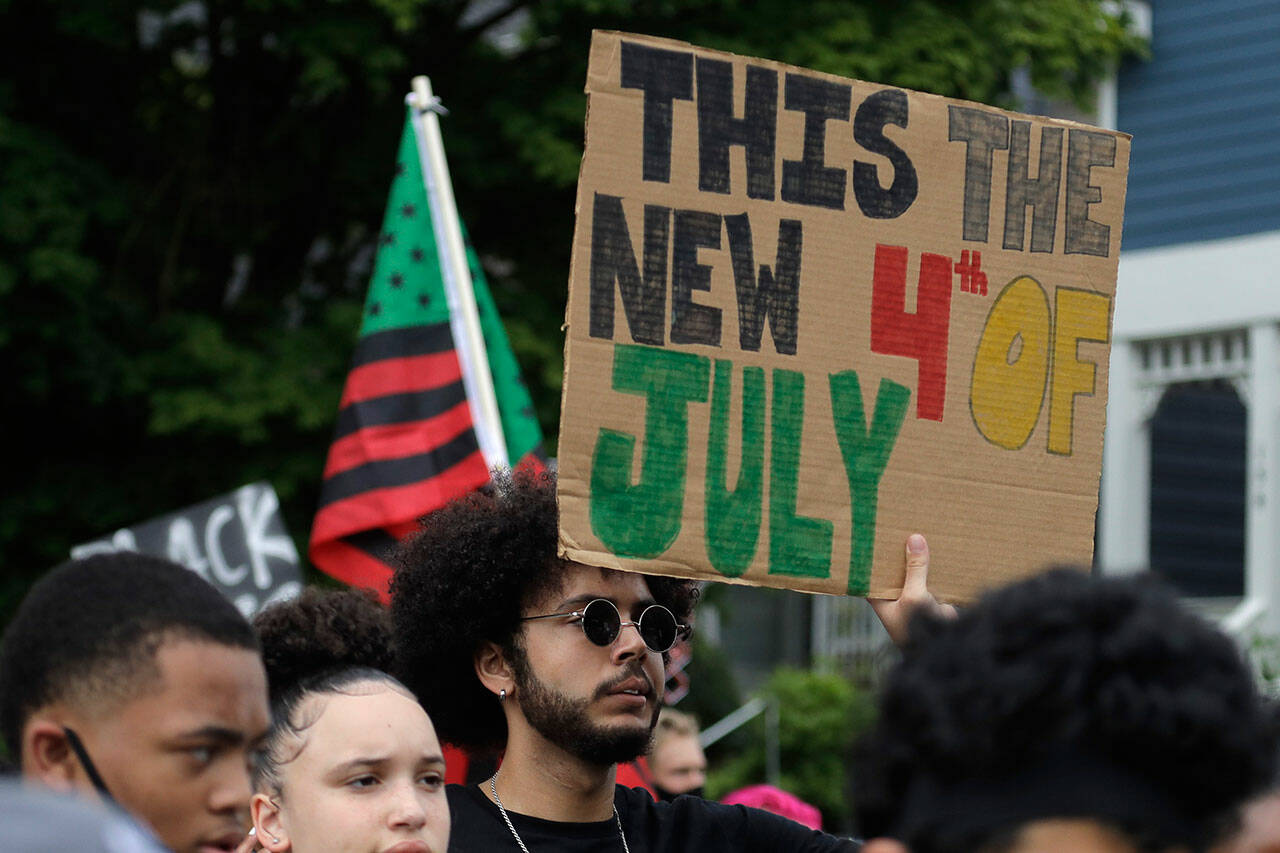By The Herald Editorial Board
If you’re among those for whom the Juneteenth holiday is a fuzzy concept, you aren’t alone.
Today’s holiday marks only the second time it has been celebrated as a federally recognized holiday and the first time as a Washington state holiday. But a better understanding of the day and its significance needs to be more widely acknowledged for what it means for American history and for our society and the challenges we face today.
Juneteenth marks the day, June 19, 1865, following the end of the Civil War, when U.S. troops led by Maj. Gen. Gordon Granger arrived in Galveston, Texas, to issue orders that enforced President Lincoln’s Emancipation Proclamation in the state, more than two years after Lincoln’s proclamation was issued. Word of the technical end of slavery — thanks to telegraph lines and newspapers — had circulated in Texas and elsewhere much earlier, but slavery persisted in some states until enforced by federal troops and the adoption of the 13th Amendment on Dec. 18, 1865.
Even in Texas, where Juneteenth has been an official state holiday since 1980, the significance of the date hasn’t always been fully explained, especially in schools, notes Steve Nelson, a diversity, equity and inclusion specialist for Alaska Air Group. Nelson attended schools in Texas, and the holiday was a state celebration and taught in schools, he said.
“It was seen as a great day, the day that the end of slavery was announced in Galveston. It was taught as something to be proud of,” Nelson said.
Yet the reason the holiday was necessary was typically glossed over in school, he said, specifically the lengths to which Texas went to hold on to the institution of slavery, fighting both Mexico and the Union to protect it.
Nelson said he didn’t learn the nuances of Juneteenth’s history until friends invited him to Juneteenth barbecues where the history was better understood and long celebrated among African American families.
“It was tough for me as a kid to learn that, that I wasn’t getting the full truth in school,” he said.
A better understanding of Juneteenth and its relation to another day of independence, July 4, is the intent behind a panel discussion — Bridging the Gap: A Community Conversation on Juneteenth and the Fourth of July — scheduled for 6 p.m., June 29 at the Edmonds Center for the Arts. Organized by Edmonds resident Alicia Crank, the panel discussion is scheduled to include Nelson; Bianca Dang, an assistant professor of U.S. history and African American studies at the University of Washington; DeLon Lewis, a STEM 101 instructor and program specialist with Everett Community College’s Diversity and Equity Center; Michelle Osborne, a former prosecutor and civil trial attorney who has worked with nonprofit agencies on racial equity and social justice issues; and Paul Pitre, chancellor of Washington State University-Everett. The forum will be moderated by Crank, who is the incoming executive director of Seattle CityClub, and Herald Opinion Editor Jon Bauer.
That slavery didn’t simply evaporate with the ink from Lincoln’s pen — and that the hardships and inequities continued following the Civil War, Reconstruction, Jim Crow laws, and through the Civil Rights era until today — speaks to the need for continued discussion on the legacy of slavery and racism.
“This is something that is important and relevant,” said Pitre, during an interview last week. “Because to me the African American population definitely needs to improve on our numbers; the issue of access to education is something so vitally important. It’s what I’ve been working on my entire career; it’s what I’ve taught and preached about.”
“The connection with Juneteenth means being able to push that forward,” he said.
In the decade before the Civil War and Lincoln’s Emancipation Proclamation, abolitionist, newspaper publisher and former slave Fredrick Douglass was asked by the Rochester, N.Y., Ladies’ Anti-Slavery Society, to speak on the subject of Independence Day.
Douglass recognized the greatness of the Founders and the importance of the day, comparing it to what Passover meant “to the emancipated people of God.” But the day could not be celebrated by all Americans, he said.
“The rich inheritance of justice, liberty, prosperity and independence, bequeathed by your fathers, is shared by you, not by me. The sunlight that brought light and healing to you, has brought stripes and death to me. This Fourth July is yours, not mine. You may rejoice, I must mourn. …
“What, to the American slave, is your Fourth of July? I answer; a day that reveals to him, more than all other days in the year, the gross injustice and cruelty to which he is the constant victim.”
Juneteenth, then, can be celebrated for the promise it delivers to make the ideals of the Fourth of July complete, to ensure what was pledged as self-evident in the Declaration of Independence: That all “are created equal, that they are endowed by their Creator with certain unalienable Rights, that among these are Life, Liberty and the pursuit of Happiness.”
Bridging the Gap
Bridging the Gap: A Community Conversation on Juneteenth and the Fourth of July is scheduled for 6 p.m. Wednesday, June 29, at Edmonds Center for The Arts, 410 Fourth Ave. N., Edmonds. The event is free but registration is requested; go to tinyurl.com/Bridging-Independence. The panel discussion also will be live-streamed.
Talk to us
> Give us your news tips.
> Send us a letter to the editor.
> More Herald contact information.

























